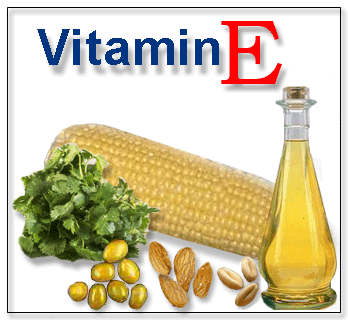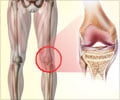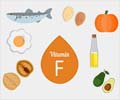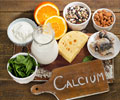Vitamin E
Vitamin E represents a family of eight fat-soluble anti-oxidant vitamins. Alpha-tocopherol is the most important vitamin E in humans. Alpha-tocopherol protects the LDL cholesterol in the blood and body cell membranes from oxidation by free radicals. (Oxidation of LDL cholesterol is believed to contribute to atherosclerosis of the arteries that can lead to strokes and heart attacks.) Alpha-tocopherol also inhibits blood clotting.

Dietary sources
Foods rich in alpha-tocopherol include green leafy vegetables, carrots, nuts, olive oil, corn oil, canola oil, safflower oil, sunflower oil, wheat germ, whole grains, and margarines made from plant oils. Meats, fruits, and milk have little vitamin E.
Vitamin E Deficiency aftermath
Severe vitamin E deficiency can lead to muscle weakness and impaired balance and coordination, and anemia. But there have been no reports of severe vitamin E deficiency among healthy adults. Vitamin E deficiency can occur in children and adults with fat malabsorption (conditions that render their intestines unable to absorb fat and fat soluble vitamins A, D, E, and K).
Why are supplements beneficial?
Oxidation of LDL cholesterol particles can lead to arteriosclerosis and increase the risks of heart attacks and strokes. Vitamin E is an antioxidant that may reduce the risk of heart attacks. In randomized controlled trials involving patients with existing coronary heart disease, the benefit of vitamin E is inconsistent. Several studies have shown that taking alpha-tocopherol supplements (400-800 IU) can reduce heart attacks, but several other studies have shown no benefit of alpha-tocopherol in preventing heart attacks. Thus, additional large-scale, prospective, placebo-controlled trials are needed.

Alzheimer's disease is a degenerative brain disease with progressive loss of mental capacity, thought in part be due to oxidation. High doses of alpha- tocopherol supplementation in one study slowed the progression of Alzheimer's disease. Although these results are promising, large scale, placebo controlled, prospective trials will be required to determine the role of a-tocopherol supplementation in the treatment of Alzheimer's disease.
Toxicity
Vitamin E in high doses can impair blood clotting and increase the risks of hemorrhage. Vitamin E can also increase the blood thinning action of warfarin, Coumadin (an anti-coagulant used in preventing blood clotting) and increase the risk of bleeding in patients taking Coumadin. Therefore, patients taking Coumadin, patients with vitamin K deficiency, and patients taking other medications that impair platelet function should take vitamin E supplements under medical supervision.
Tips for supplementation
All adults are recommended to consume vitamin E rich foods and to take a multivitamin daily. (An average multivitamin tablet contains 30-40 IU of vitamin E).
Consult the doctor regarding additional vitamin E supplements. For example some doctors recommend supplementation of 400 IU of vitamin E for all healthy middle age or older adults to prevent strokes, heart attacks, and cancers. Others recommend vitamin E supplements (400 IU) only for patients with small dense LDL cholesterol particles and with familial hypercholesterolemia. These patients are susceptible to oxidation and have higher than normal risks of heart attacks.

















